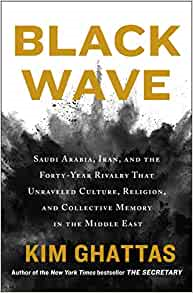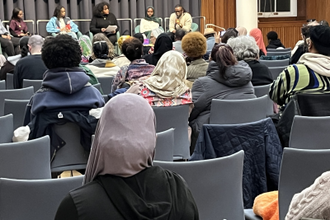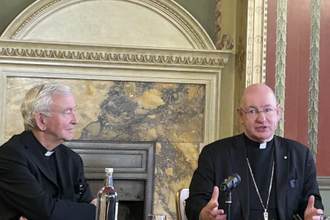Book: Black Wave

Black Wave: Saudi Arabia, Iran and the forty-year rivalry that unraveled culture, religion. And collective memory in the Middle East - by Kim Ghattas, Henry Holt, New York.
"What happened to us?" is the question posed by Lebanese author Kim Ghattas as she surveys the wreckage of Syria, Egypt, Yemen, Iraq, Lebanon and Pakistan. The answer is "1979." Ghattas reveals the region's descent into hell through the eyes of several brave individuals who refused to be silenced by fear. The big picture she paints is depressing, but she concludes with hope that young people will reject being manipulated by clerics and politicians.
This superb chronicle of four decades of destructive sectarian conflict illuminates the core themes often obscured by day-to-day reporting on the region. Three earth-shaking events in 1979 precipitated the downward spiral of the Middle East: the Iranian revolution, the Soviet invasion of Afghanistan, and the Islamist occupation of Mecca in Saudi Arabia.
Ghattas makes clear that after 1979, Iran and Saudi weaponized sectarian identities to pursue their own paranoid and expansionist agendas. Fearing the example set by the overthrow of the shah, the Saudis have used (and continue to use) oil wealth to spread Wahhabism, its joyless, authoritarian version of Sunni Islam, destroying previously more tolerant societies such as Pakistan. They export an intolerant jihadist interpretation of Islam, hoping to rid their own kingdom of its trouble-makers, at the same time as extinguishing a more inclusive form of Sunni faith.
It was Saudi King Fahd who ordered a new, definitive translation of the Koran in which passages encouraging the hatred of Christians and Jews were inserted; he ordered the confiscation of all previous versions in Saudi, and then exported millions of his approved, racist version around the globe to madrassas and mosques paid for with Saudi money. Consistent throughout has been Saudi's refusal to take responsibility for the consequences of its actions (Al Qaeda, 9/11, the destruction of Yemen, the elimination of tolerance in Pakistan, the Muslim Brotherhood, the murder of Jamal Khashoggi).
The ayatollahs of Iran have relentlessly stirred up Shia Muslims to counter the influence of Saudi, igniting proxy wars in Lebanon, Yemen, Syria and Iraq. If anyone benefited from the 2003 US invasion of Iraq, it was Iran, which now controls territory and rulers from Tehran to the Mediterranean. Only the discontent of the Iranian public, fed up of bankrolling this expansionism, may eventually clip the wings of the all-powerful Republican Guard.
This is the story of leaders who thought they could use extremists to further their own political ends (Sadat in Egypt, Saddam in Iraq, Bhutto in Pakistan, the USA in Afghanistan): in each case, they unleashed destructive forces they could not control.
It is also the story of personally corrupt men who seem to hate women, taking it upon themselves to determine who is a good Muslim; and hypocritical societies such as modern Pakistan which put the full burden of honour on female shoulders, averting its eyes from the degenerate behaviour of men, rather like the Victorians.
As the power to hold their young populations in line with religion fades, both Iran and Saudi are reverting to nationalism, argues Ghattas. Sadly, there seems to be no international leadership capable of understanding the subtlety required to navigate these roiling waters. The virus may be distracting us from events in the Middle East at the moment, but the suffering of its voiceless people continues.


















